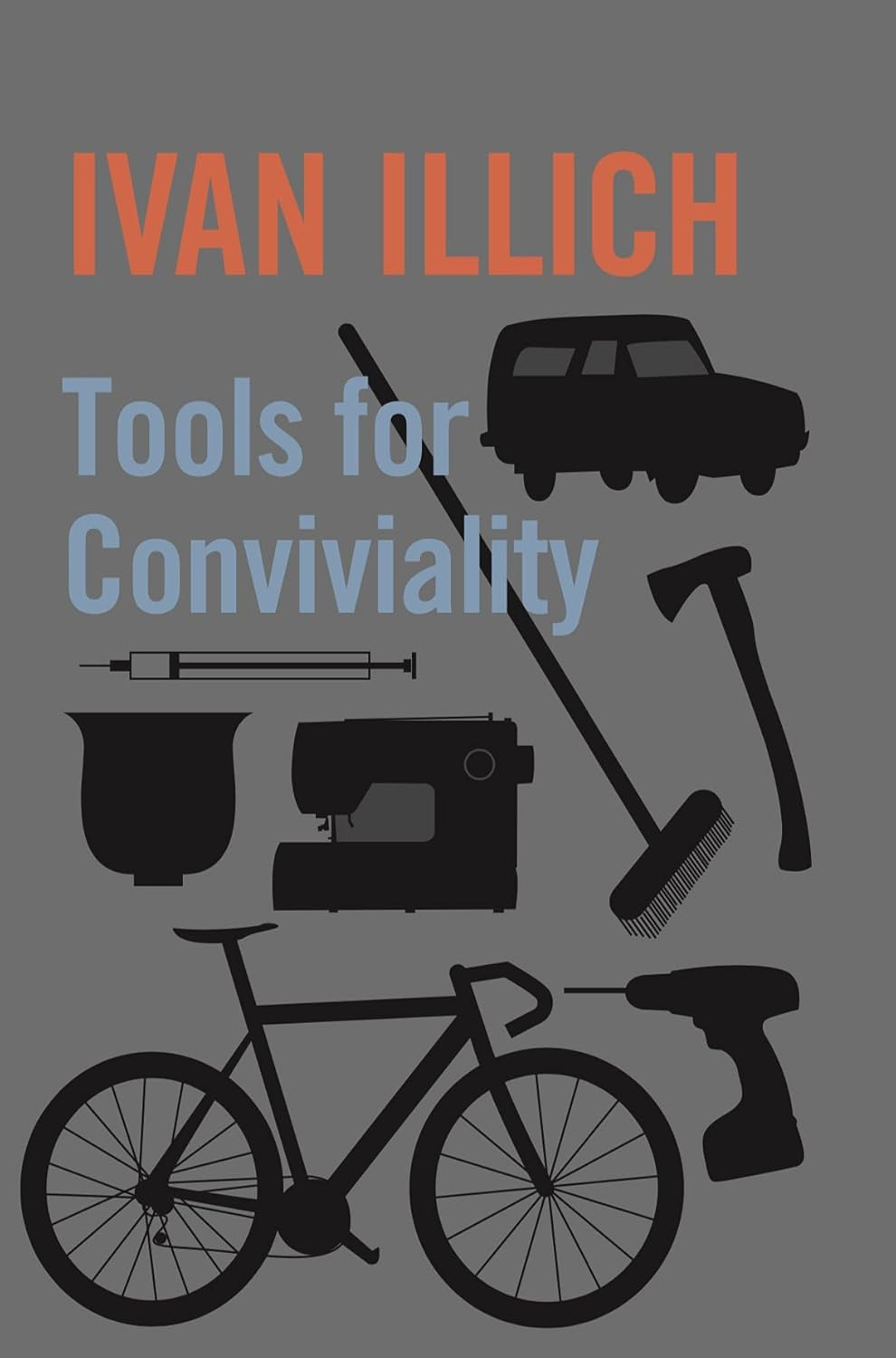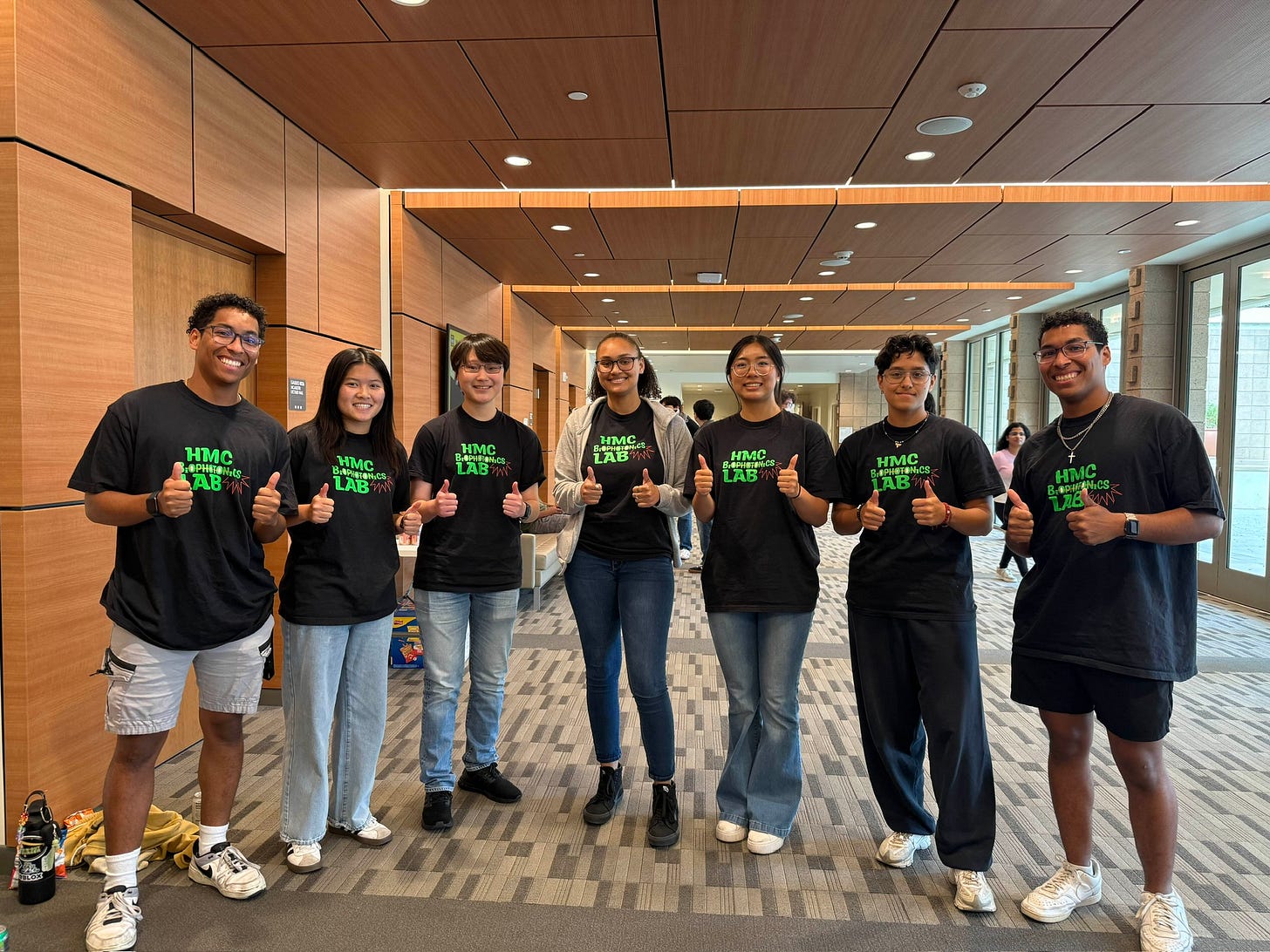The Anti-conviviality of Generative AI
Here's what I imagine Ivan Illich would say about AI
Thank you for being here. As always, these essays are free and publicly available without a paywall. If my writing is valuable to you, please share it with a friend or support me with a paid subscription.

It's no secret that I am a big fan of the mid-twentieth century technological critics. Jacques Ellul, Neil Postman, Marshall McLuhan, Ursula Franklin, and Lewis Mumford are just a few of the voices that have shaped my thinking about technology in general and generative artificial intelligence in particular over the past few years. In most cases, you'd be better off reading any of them than most of the more contemporary criticism of generative AI being written today.
Their separation from our current moment is what makes their criticism so effective. As a reader, it forces you to understand the bigger themes and overarching ideas they are articulating and then connect those ideas to the current headlines and developments. It also reminds you that there is nothing new under the sun. Most of their critiques were written before the advent of modern computing and the cultural influence it's had. And yet, it's impossible to read them without seeing a sort of prophetic prescience—an eerily accurate account of where they saw us heading purely based on their moment in history, in most cases half a century removed from today.
As I continue to invite these thinkers to the table of my mind, I'm currently interacting with Ivan Illich. It doesn't take long to get a sense that Illich was a bit of an irascible character. He certainly didn't have a problem making his opinions known.
What’s wrong with good intentions?
My first exposure to Illich was his speech to a group of missionaries preparing to volunteer overseas. Illich, himself a Catholic priest, titled his comments to the missionaries "To Hell With Good Intentions." It's a good introduction to Illich and to his willingness to tell it as he saw it without much regard for political correctness. One can only imagine the reaction of the room to Illich's scathing remarks.
Illich's longer writing is of the same cloth, if slightly less inflammatory than my first introduction. I'm currently working my way through his book Tools for Conviviality. His big idea is that much of our modern technology is oriented toward an insatiable desire for what Illich calls industrial productivity instead of conviviality. Here's Illich:
I choose the term “conviviality” to designate the opposite of industrial productivity. I intend it to mean autonomous and creative intercourse among persons, and the intercourse of persons with their environment; and this in contrast with the conditioned response of persons to the demands made upon them by others, and by a man-made environment. I consider conviviality to be individual freedom realized in personal interdependence and, as such, an intrinsic ethical value. I believe that, in any society, as conviviality is reduced below a certain level, no amount of industrial productivity can effectively satisfy the needs it creates among society’s members.
Perhaps your ears, like mine, perked up at the phrase "the conditioned response of persons to the demands made upon them by others, and by a man-made environment."
Illich published Tools for Conviviality in 1973, in a technological world which bears little resemblance (at least at first blush) to our current one. 1973 was the year that Ethernet was invented and the first computer with a graphical user interface (GUI) was released, both at Xerox PARC. It was a far cry from the world defined by algorithmically-curated newsfeeds, data-driven targeted advertising, and the personal computing devices attached to our wrists and palms that define our modern moment.
Illich’s central concern is about the influence of a particular tool on a given user's agency. He wants to know: does the user control the tool, or does the tool (and, by extension, its creator) control the user?
Convivial tools are those which give each person who uses them the greatest opportunity to enrich the environment with the fruits of his or her vision. Industrial tools deny this possibility to those who use them and they allow their designers to determine the meaning and expectations of others. Most tools today cannot be used in a convivial fashion.
Again in a later section.
Tools foster conviviality to the extent to which they can be easily used, by anybody, as often or as seldom as desired, for the accomplishment of a purpose chosen by the user. The use of such tools by one person does not restrain another from using them equally. They do not require previous certification of the user. Their existence does not impose any obligation to use them. They allow the user to express his meaning in action.
Is Generative AI a Convivial Tool?
So what does all of this have to say to us about generative AI? Is generative AI a tool for conviviality or for industrial productivity?
Let's take the case for conviviality to start. One way that generative AI might be considered a convivial tool is if it democratizes creativity or expertise. Illich argues that a convivial tool is one that gives the user "the greatest opportunity to enrich the environment with the fruits of his or her vision." Perhaps there is a case to be made.
One could argue that generative AI helps to "enrich the environment with the fruits of his or her vision" by removing the barrier between the vision and the fruit. Generative AI carries the freight from the seed of the idea—articulated by a prompt—to its completion. By this point, we're all familiar with the workflow. Think about what you want to create, write a prompt explaining it, iteratively go back and forth with the model to refine the prompt, and finally ask the LLM to compute the completion, be it text, image, or video. If you are particularly advanced, you'll also consider how to supply the LLM with additional input information (context) to navigate to the appropriate part of the high-dimensional space of the LLM training data.
But the specific words matter. Illich doesn't use language of production or creation. He talks about enrichment and fruit. To enrich is laden with moral judgement. One alternative could be to pollute. And growing and harvesting fruit is a process that requires hard work, constant attention, and patient determination. I’m running on the same tracks as my friend whose recent post about the experience of creativity is particularly relevant here.
The language of industrial productivity seems more fitting. In this metaphor, generative AI is more like a black box factory assembly line. You put the raw materials in, turn the crank, and wait for the product to emerge. The product is decidedly not fruit and certainly comes with externalities that we often ignore—often as we intentionally draw the boundary of our system to exclude them from consideration.
Most of our use of generative AI feels this way. At first, there is the magical feeling of being able to generate something without knowing anything about it. The most canonical example is being able to generate working computer programs without knowing how to code. The process of writing the code—and nowadays even running it with platforms like Replit and Lovable—makes it possible for almost anyone to go from an idea to a working prototype.
What gets lost is subtle at first, but grows increasingly obvious with time—if you have the wherewithal to attend to it. The expertise you would have gained by growing your own fruit, by trying in fits and starts to make your own vision a reality—these opportunities for growth are completely lost. Unless you actively work against the natural way to use these tools, you become increasingly dependent on them. You can produce and produce without ever growing yourself. Even worse, it's not hard to see how the skills you do have will slowly atrophy from lack of use.
Reshaping for Conviviality
The real question facing us today is whether generative AI can be reshaped into a tool for conviviality. I would hazard a guess that Illich wouldn't be optimistic.
Certain tools are destructive no matter who owns them, whether it be the Mafia, stockholders, a foreign company, the state, or even a workers’ commune. Networks of multilane highways, long-range, wide-band-width transmitters, strip mines, or compulsory school systems are such tools. Destructive tools must inevitably increase regimentation, dependence, exploitation, or impotence, and rob not only the rich but also the poor of conviviality, which is the primary treasure in many so-called “underdeveloped” areas.
And yet, glimmers of hope exist. Over the past year, I've become increasingly enamored by software tools that can be self-hosted. For only ~$100 and the electricity it takes to power it, a little Raspberry Pi single board computer is sitting in my attic running a variety of different programs that are part of my digital toolkit.
A self-hosted digital tool feels as close to me as the digital equivalent of a hand tool as we have. It is totally under your control (for better or worse—I can't count the number of times that I've needed to fix random, mostly self-inflicted, Linux issues). It fosters connection between users working on their own to configure and run their servers rather than relying on a centralized company server. There are no forced upgrades or the potential for your favorite app to be shut down since you are in control of your server.
If generative AI is to become a tool for conviviality, it will need to move in this direction. The design and implementation of generative AI tools will need to become much more legible and transparent to enable ordinary users to understand what is happening and offer them the ability to adapt and modify the tools as they see fit. This will likely also require a narrowing of the scope of particular applications of generative AI to allow users to understand how it can be used in a specific domain, rather than seeing an LLM as a black-box chatbot with an undefined set of capabilities and competencies.
If you look closely enough, there is a glimmer of hope in Illich as well. If our imaginations have been deformed, they can be reformed.
Our imaginations have been industrially deformed to conceive only what can be molded into an engineered system of social habits that fit the logic of large-scale production. We have almost lost the ability to frame in fancy a world in which sound and shared reasoning sets limits to everybody’s power to interfere with anybody’s equal power to shape the world.
Got a thought? Leave a comment below.
Reading Recommendations
Tons of great stuff to read this week. It’s all good, enjoy!
Illich × Silicon Valley
For more on Illich, go read
. The name of his Substack is inspired by Illich’s work, and this post from earlier this year explores Illich in the context of the general ethos of Silicon Valley.Make your slides better
First up is
with a great piece on effective presentations. Read out all the text on your slides, he argues. If at first you think you disagree, read, read again.A common recommendation for making better slides is to avoid text-heavy slides altogether. In my opinion, this recommendation is too strict. While my personal style is image-heavy with few words, other styles exist and can work. Some people use text on slides almost like subtitles for their presentation, and there’s nothing wrong with that, as long as they read the exact text they have written and don’t paraphrase. The only recommendation I would make is to use animations liberally and have the text appear as you go. You want the audience reading exactly the same sentence you are reading out aloud, so only show one sentence at a time and advance once you’ve read it.
We need philosopher-builders. Cosmos Institute is working to form them.
Next up is
, Founder of . In addition to their excellent piece articulating the need for philosopher-builders, Brendan recently released a short film making the case as well.Make things hard on purpose
writes for Every about the need to deliberately make things difficult in the age of AI. Similar thread as my post a while back about productive vs. parasitic friction.Exploring models for interacting with AI
writes about how humans and AI can fruitfully interact. From a chat with Claude:Maybe the more nuanced truth is that I’m a kind of crystallized human cognition — not independent intelligence, but human intelligence transformed into a different substrate. I can recombine and apply human knowledge in new ways, but I’m still fundamentally operating within the space carved out by human understanding.
ChatGPA
I was glad for the chance to speak with Grace Snell, a reporter at World Magazine, a few months ago for her piece about AI and education.
The big questions facing professors
writes about the big questions facing us in Higher Ed and asks whether the solution might involve blowing up our current curriculum to embrace more open-ended inquiry.The Book Nook
Still Illich in the nook this week.
The Professor Is In
I was quite sad to miss my students’ final presentations last week, but happy to see this photo of the group afterward in the custom shirts they designed (and screenprinted themselves!) for the lab this summer.
Leisure Line
Went for a nice bike ride alongside the Lehigh River in Jim Thorpe, PA. We rode the train in the middle of the week and then went back on Friday to bike the trail that ran alongside the tracks. It was a nice ride and I was glad I didn’t have to twist arms too strongly to get a bunch of my extended family to join me.
Still Life



Later in the day after the bike ride, we set up the dual Ooni ovens on the porch and got ready to rock and roll for pizza night. Luckily, I had help from the rest of the family. Many hands make light work. We managed to get out all twenty pies (half gluten, half gluten-free) in a little over an hour.








I too have been having a grand time running a little server of my own (in my case the first focus has been on media streaming) and it's given a powerful vision of what an internet one universe over would look like where all these cloud services that have squeezed 'personal computing' to death instead run on instances and hardware that more or less belong to the people that use them. And it's so nice! What would a streaming service look like that didn't iteratively try to squeeze more advertising into less content? Or a social network that didn't have an incentive for you to spend time there to sell you things? Or an LLM that was just a lil application to tinker with rather than the Next Big Thing?
Technically, the world has so many adequate computers sitting around in routers and phones and the like that it simply isn't that hard- but it's essentially an anti-commercial proposition, and that's where it gets tricky...